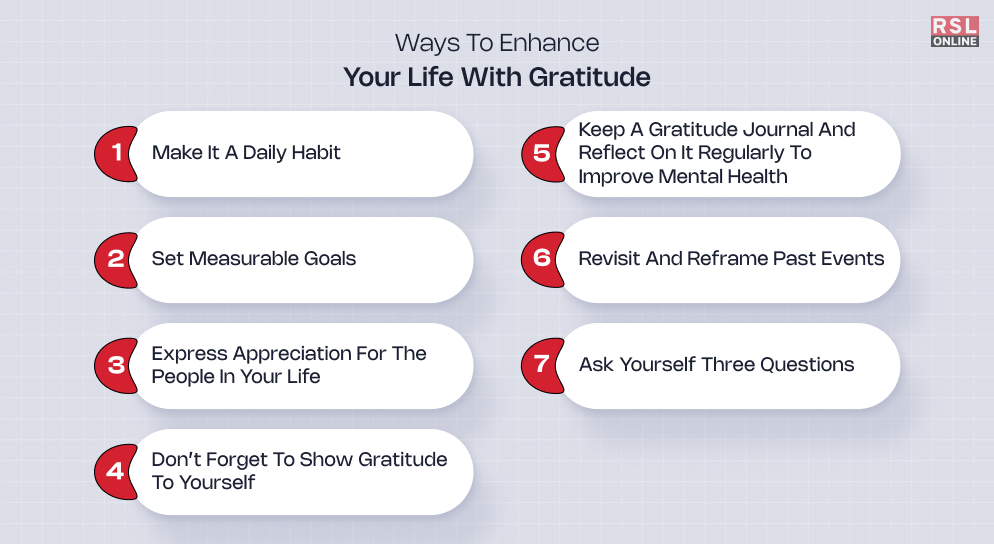Gratitude has turned into a bit of a buzzword lately, much like self-care.
And also, like self-care, there’s much more to gratitude than flashy headlines and a sense of toxic positivity.
Although gratitude does add positivity to your life, it’s not about ignoring the negative and difficult aspects.
Instead, it’s about approaching life from a stance of gratitude for the things you have rather than focusing on what you lack. Below, find five easy ways to live a life of gratitude.
Ways to Enhance Your Life With Gratitude

Living a life of gratitude is not at all a complex thing. But if you are to do it, you have to be thoroughly committed and disciplined. In this section, we discuss some ways through which you can practice living a life of gratitude. So, without wasting any more time, let’s just dive into the topic.
1. Make It A Daily Habit
Consistent gratitude is an easy way to enhance your life. Just like any habit, it’s important to engage in gratitude day after day until it begins to come naturally and becomes part of your routine.
Try thinking of three things you’re grateful for when you get up in the morning or before you go to bed at night (or both)! This will shape your mindset to be more positive and to focus on all the great things you already have in your life.
2. Set Measurable Goals
In order to fully appreciate the progress, you’ve made in life, be sure to set measurable goals. For example, rather than setting a goal “to be successful,” which is vague and hard to measure, set a more specific goal that you can act towards. Then, allow yourself to feel grateful for all you’ve done to bring yourself closer to your goals!
3. Express Appreciation for The People in Your Life

We all have people we’re grateful for. But how often do we actually express our gratitude for everything they’ve done, or for the fact that they’re always there when we need them?
Make the effort to tell the people you care about just how special and appreciated they are. Bringing this type of positivity and gratitude into your relationships is sure to enhance them, and you may even inspire your loved ones to express their gratitude for others as well!
4. Don’t Forget to Show Gratitude to Yourself
Think about all of the things you do every single day. You might get up, get ready, and go to work. Or you might wake up and take care of your children each day. No matter what your daily responsibilities entail, give yourself credit and gratitude for all that you do! Yes, that’s what you call it living a life of gratitude.
It’s important to recognize the contributions you make and the things you do for yourself and others. Also, it is not selfish to appreciate yourself and feel grateful for the things you’ve accomplished; it’s part of having a healthy sense of self-worth and self-love.
Having gratitude for yourself can also look like rewarding yourself every once in a while, and going easy on yourself when things are especially tough.
5. Keep a Gratitude Journal and Reflect on It Regularly to Improve Mental Health

A great way to implement gratitude into your daily life is to start a gratitude journal.
It doesn’t have to be anything fancy, and it doesn’t necessarily need to be a physical journal; you can keep it on your phone or computer if that’s what you prefer.
Regardless of its location, all you need to do to keep a gratitude journal is write down a few things you’re grateful for each day. Then, be sure to read over your previous entries regularly, especially on days you don’t feel especially positive.
Remembering all that you have is a great pick-me-up for a low mood, and it can also help alleviate symptoms of mental health disorders such as Obsessive-Compulsive Disorder.
The hallmarks of OCD obsessive thoughts and compulsive behaviours can be combated with gratitude; for example, you could refocus an obsessive thought pattern by reading over your gratitude journal and continuing to note things you’re grateful for.
If you commonly experience symptoms like unwanted thoughts and a strong need for order and cleanliness, you may be living with OCD; you can take a free assessment at Mind Diagnostics.
While gratitude is a great start when seeking relief from mental health issues, it’s also wise to get help from a counselor or therapist when living with mental health disorders like OCD.
6. Revisit and Reframe Past Events
Most of us need to revisit past events that we regret even at present. It could be anything, from cheating with your friends and relatives, bad behavior, and doing injustice to yourself.
Maybe you regret your poor financial decision-making. Although they may lead to disappointment, you will end up learning something or the other from them.
You also have to be highly curious, assertive, and even compassionate. Yes, finding the life lessons from those incidents would help you form a better version of yourself; that’s the secret.
7. Ask Yourself Three Questions
You must be introspective about your relationship with siblings, parents, and even friends. When you are all alone, ask yourself these three questions.
The first is, “What have I received from…?”. The second question is. “What have I given them?” and the third question is. “What trouble I have caused to…?”
Answering these questions, most honestly, definitely turns out to be like introspection and self-purgation. These answers will definitely make you much more aware of the past and prepared for the future. You can call that living a life of gratitude.
The Bottom Line
Implementing gratitude into your daily life comes with many benefits. It can improve your relationships, increase your self-esteem, enhance your psychological well-being, and make it easier to cope with mental health issues such as depression and OCD.
Plus, it’s extremely simple and easy to make gratitude a part of your life.
By making it a daily habit (perhaps by keeping a gratitude journal), setting measurable goals, and expressing gratitude for yourself and others, you’ll find your mindset becomes much more positive and your life feels better overall!
Additional Reading:




























